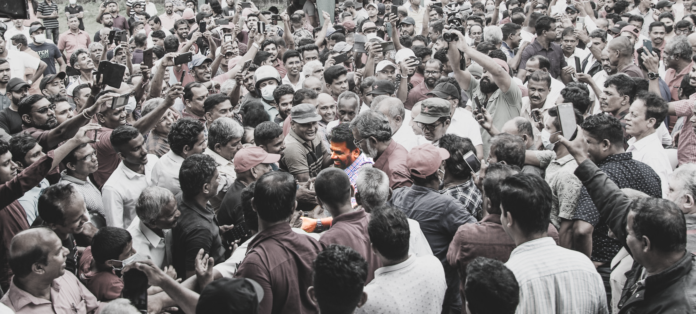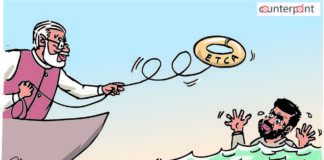By Kassapa
President Anura Kumara Dissanayake has just passed one hundred days in office, with hardly any fanfare unlike during the ‘Yahapaalanaya’ government where they set up a 100-day programme. It is early days yet in terms of a five-year Presidency but what do the past hundred days suggest? Perhaps it is time to reflect, even if it only serves as an eye-opener for the government itself.
When Dissanayake assumed the Presidency shortly after his election victory on September 21, there were many who were anxious about the country’s future. Will the country revert to a socialist state with a closed economy? Will there be the kind of hardships we witnessed in mid-2022? These concerns, based mostly on the past-track record of the Janatha Vimukthi Peramuna (JVP) which is the major partner of the Jathika Jana Balavegaya (JJB), also explain why Dissanayake polled only 42 per cent of the vote and not an overwhelming majority.
We now know the answer to these questions. It is a resounding ‘no’. As far as the economy is concerned, Dissanayake has not veered one bit from the course charted by his predecessor Ranil Wickremesinghe, sticking diligently to deadlines and targets imposed by the International Monetary Fund (IMF) and retaining the services of Central Bank Governor Nandalal Weerasinghe and Treasury Secretary Mahinda Siriwardena to ensure that the deal with the IMF is not soured in any way. The economy is not worse off, either: the country’s credit rating was upgraded recently.
Dissanayake’s other major success was his visit to India. The opposition was gleefully pointing to the JVP’s past, where one of its ‘five classes’ of indoctrination was on ‘Indian Expansionism’ and how he would reconcile this with New Delhi. Not only did the visit to India turn out to be a huge success, Indian Prime Minister Narendra Modi reportedly agreed to remove any references to implementing the 13th Amendment to the Constitution from the joint statement released at the end of the visit. Even the ever-critical Ranil Wickremesinghe conceded the visit enhanced Indo-Lanka relations.
Perhaps Dissanayake’s major setback- where there should have never been one- was regarding former Speaker Ashoka Ranwala’s educational qualifications. When the issue first erupted, it was allowed to simmer for almost a fortnight. Some JJB parliamentarians went on the offensive; one challenged the opposition for a no-confidence motion and Cabinet spokesman Nalinda Jayatissa said they didn’t ‘take the allegations above the knees’.
It was left to Dissanayake to clean up the mess. This was done, sacrificing Ranwala. Dissanayake emerged relatively unscathed, even enhancing his image slightly because he stood firm on his pledge to ‘punish those who err, regardless of the position they hold’.
Dissanayake also had to contend with rising prices of essential food items such as rice, coconuts, eggs and even certain vegetables. He did confront rice mill owners, raise the ceiling for retail prices of rice and even resort to importing some stocks of rice but that hasn’t resolved the issue fully. Whether Dissanayake continues his iron-fist-in-a-velvet-glove approach towards the rice trade remains to be seen. He may have won Round 1 in the battle against the rice cartels but Round 2 could be anybody’s game and issues related to rice have historically been challenging for governments.
If the past one hundred days are anything to go by, Dissanayake’s main challenge will be to constantly counter the challenges that come from within. It is not that his leadership will be challenged. Rather, it would be in the form of ‘damage control’ as a result of the various statements made by his ministers and MPs.
So, far there is a close race to emerge as the person who causes the most damage. Wasantha Samarasinghe seems to lead the pack with his comments about a Mafia for every commodity that has seen a price hike. Close on his heels are Nilanthi Kottahachchi (‘people have right to call a lie a truth’ and ‘we will bring stolen money from Uganda’), Nalin Hewage (‘a vehicle for every family’) and even the learned Harshana Nanayakkara (‘a conspiracy to call me a Dr.’). Thankfully, the likes of K.D. Lalkantha and Sunil Handuneththi appear to have learnt from their past follies and are keeping a low profile, at least for now.
In moving into the next phase of his Presidency, Dissanayake must however not forget that he was elected, breaking a seven-and-half-decade-old trend of power alternating between major political parties, not to perform an economic miracle. It was to usher in a new political culture where the law applies to all equally, where offenders past and present are dealt with and where corruption is not synonymous with politicians. The other cornerstone of his election campaign is the pledge to abolish the Executive Presidency and replace the current Constitution with one that suits the nation’s needs better.
It is in these spheres that there hasn’t been much noise. It must be noted that ‘punishing culprits of corruption and serious crimes’, especially if done in a fair manner without a hint of political victimisation, is a long process where the law must be allowed to take its course. Nevertheless, it has not been one of the ‘hot topics’ that is being discussed apart from mentioning that certain cases have been prioritised for investigation. We can only hope that the duo of Ravi Seneviratne and Shani Abeysekera will be up to this task and justify their appointments.
Similarly, there has been little or no mention of the process of constitutional reform. Dissanayake has the advantage of a two-thirds majority in Parliament, so there can be no excuse for delaying or avoiding keeping this key campaign promise. Presidents before him have done exactly that- promised to abolish the Presidency and forgotten all about it when in office- but Dissanayake was elected because people thought he would be different to the others.
We are not suggesting that abolishing the Presidency should be the highest priority for Dissanayake, but this being a complex and long-drawn out process that probably requires approval at a referendum, we like to at least see its beginnings. As Dissanayake himself has pointed out, ‘it is now or never’.
Overall then, Anura Kumara Dissanayake deserves an above average ‘credit pass’ for his first one hundred days in office for some significant steps regarding the economy and foreign relations and for avoiding major blunders. Yet there certainly is room for improvement, which the public which voted him into office would dearly wish to see in the coming months.



 Logging you in...
Logging you in... Loading IntenseDebate Comments...
Loading IntenseDebate Comments...

